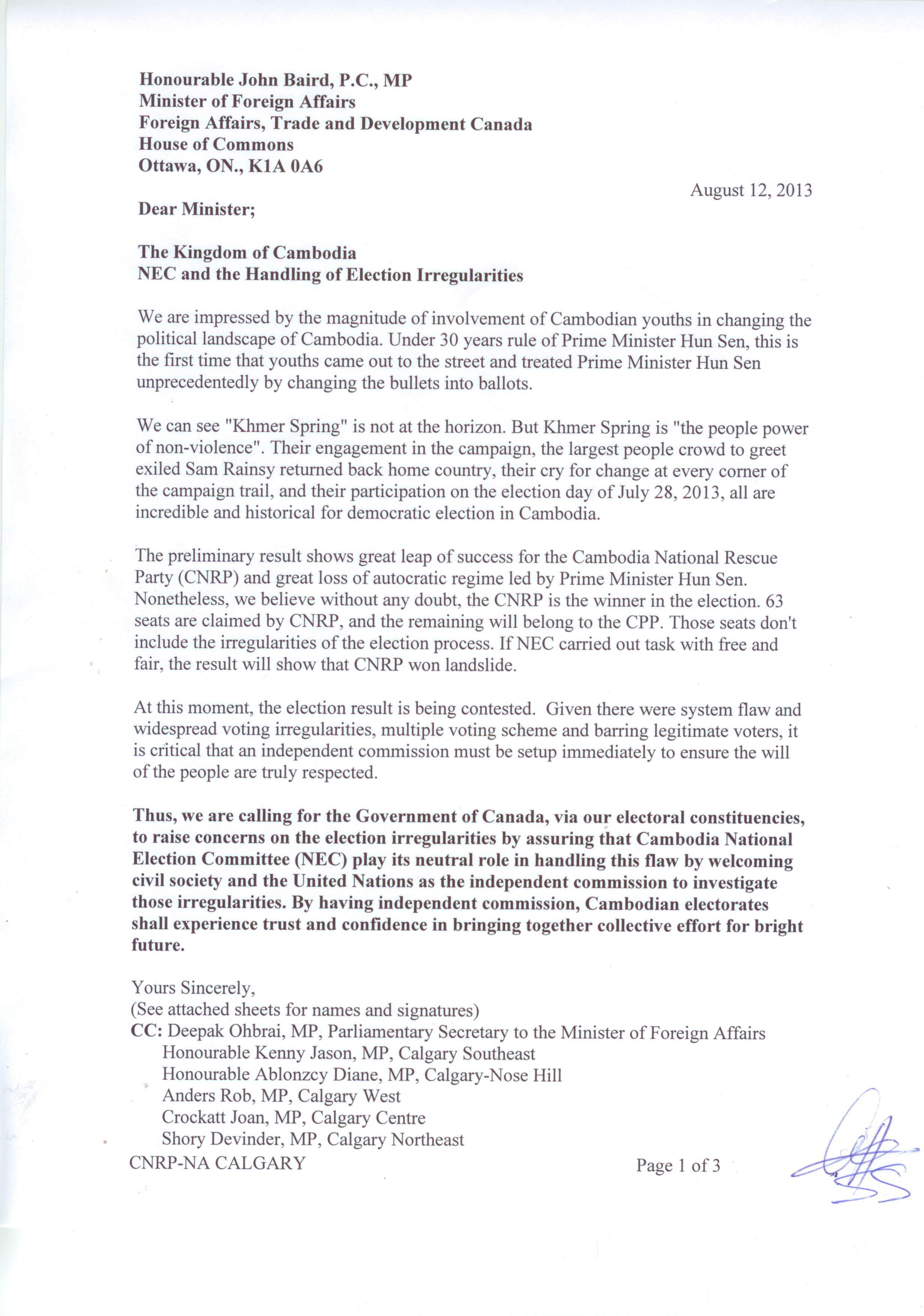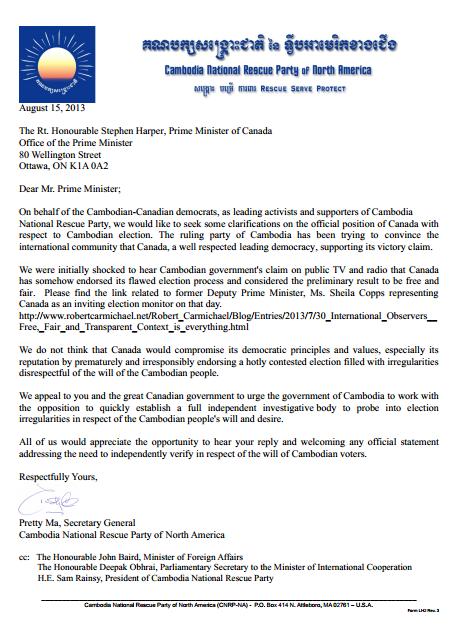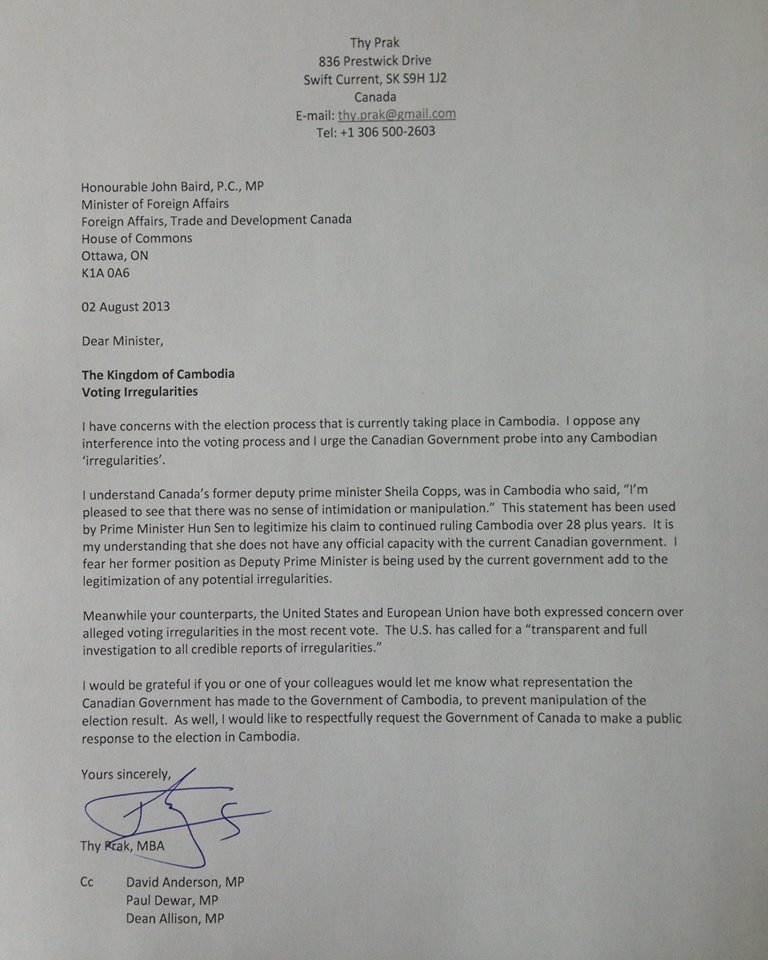While the deadline for mass rally has been announced by the leadership of CNRP on September 7, 2013, one day prior to the NEC’s official announcement of the national election result, the debate and discussion are richly exposing through the media and meeting tables. Puzzling questions are coined on the CNRP’s leadership to choose between mass rally or diplomatic negotiation, or both are instrumental for the effort?
According to the press released and continual announcement of the CNRP’s leadership, both scenarios are clearly displayed to garner political progressive for a new update of political culture in Cambodia.
Responsiveness
One of the effective work is the responsiveness. The leadership of CNRP has worked well responsive to the demand of the supporters. It is part of the democratic principle that being a leader is not a divine power but a supportive energy from the supporters. 30% of Cambodian youths have been calling for change and genuine reform in Cambodia. The preliminary result of election doesn’t satisfy those youths, so the optional mass solidarity is not a mere or flimsy future. I think the announcement of mass rally is the preparedness to answer their demand for their bright future.
However, the locus of CNRP’s leadership are still mainly focusing on diplomatic solution. As we all know, this party is created by the people whose weapons are not guns or tanks, but two empty hands, two bear feet and one head. These equipments are the manifestation of non-violence and tolerance. If the negotiation results is in vain, just “let it go” like Nelson Mandela said for the mass rally but it must be non-violence and in the manner of very well organized. As a matter of fact, many Cambodian people especially youths are cheerfully and bravely to come out to the street to participate with any type of peaceful mass rally.
For Cambodian diapora, beside of coming out to the street everywhere around the world to join the rally, they have also petitioned their constituents to pay attention at the irregularities of Cambodian election.
Cambodian diaspora in Canada
 To what I have known, the CNRP’s supporters in Canada has tirelessly worked to lobby its government about the Cambodian election and its result irregularities. Attached here is the letter to the Minister of Foreign Affair of Canada through local constituencies to support the request of CNRP’s quest for free and fair election in Cambodia by including civil society and the United Nations into the commission of investigation body on those vast election irregularities.
To what I have known, the CNRP’s supporters in Canada has tirelessly worked to lobby its government about the Cambodian election and its result irregularities. Attached here is the letter to the Minister of Foreign Affair of Canada through local constituencies to support the request of CNRP’s quest for free and fair election in Cambodia by including civil society and the United Nations into the commission of investigation body on those vast election irregularities.
Further to this, there was a response from the government of Canada certifying that the 
view of Sheila Copps on her capacity to the result of Cambodian election on the July 28th, 2013, is just her personal view, it doesn’t represent the view of the Canadian government at all.

These activities of Cambodian diaspora are very vivid and effective in utilizing the power of diplomacy and non-violence campaign responsive to the CNRP’s key leadership.
Hi Pretty:
It was nice to see you and Sam earlier this year in Ottawa. I thought we had a pretty good conversation.
We encourage all sides to seek a peaceful and transparent resolution to disputes related to the recent elections.
The election observation team mentioned in the article was not sponsored by or affiliated with the Government of Canada and in no way reflects the views or position of the Government of Canada.
I am personally not aware of the role played by Ms. Sheila Copps in this process. Any actions on her part are of those of a private citizen and do not reflect or articulate the views of the Canadian government.
We recognize that the opposition and members of civil society have expressed concerns with the elections process.
We hope the authorities in Cambodia will review these legitimate concerns in a fair and transparent manner.
Regards,
Paul Hong
Senior Policy Advisor
Office of the Honourable John Baird, P.C., M.P.
Minister of Foreign Affairs
613-995-1851 (w)
Former cabinet minister caught up in disputed election crisis in Cambodia
THE CANADIAN PRESS
Last updated Friday, Aug. 16 2013, 6:47 PM EDT

Sheila Copps speaks during the presidential candidates debate at the Liberal Party’s policy convention in Ottawa on Jan. 13, 2012. (Peter Power/Peter Power/The Globe and Mail)
A former Canadian cabinet minister has been caught up in the political crisis in Cambodia following that country’s hotly contested elections last month.
Former deputy minister Sheila Copps served as an election observer on behalf of an organization that lists among its leaders Cambodia’s Prime Minister Hun Sen, who has ruled the country for 28 years.
The group — called Centrist Asia Pacific Democrats International (CAPDI) — released a statement saying the July 28 elections were “free, fair and transparent” and called on all political parties to respect the results.
Cambodia’s opposition disputed its narrow loss and called for an independent committee to probe allegations of widespread fraud by the ruling Cambodian People’s Party.
The opposition wrote to the Harper government Thursday asking it to clarify Canada’s position on the elections, saying the ruling party is exploiting Ms. Copps’s endorsement of the results for propaganda purposes.
A Foreign Affairs spokesman in Ottawa says Canada has been following recent events in Cambodia closely, but adds that the election observation team mentioned in the letter “was not sponsored by or affiliated with the government of Canada.”
Ms. Copps defended her decision to serve as an election observer, saying she is a member of CAPDI, which includes civil society members as well as current and former political leaders from more than 20 countries.
“Our invitation came from the Cambodian Election Committee and we were asked to observe election day practices,” she said in an email to The Canadian Press.
“It is standard practice in election monitoring to recruit people from other countries with election experience.”
As a private citizen Ms. Copps has the right to say whatever she wants to say, said Sorpong Peou, a political sciences professor at Ryerson University who has observed Cambodian politics for 20 years.
“Except that in reality the (CAPDI) statement is very political in my view, meaning it was used to justify the election results that are still in dispute,” he said.















 Sheila Copps speaks during the presidential candidates debate at the Liberal Party’s policy convention in Ottawa on Jan. 13, 2012. (Peter Power/Peter Power/The Globe and Mail)
Sheila Copps speaks during the presidential candidates debate at the Liberal Party’s policy convention in Ottawa on Jan. 13, 2012. (Peter Power/Peter Power/The Globe and Mail)
Comments are Closed